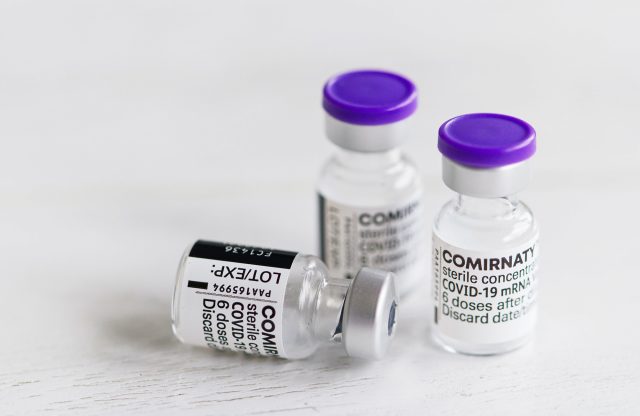Dr Robert Hess: Antiviral drugs – One more strategic option in the fight against SARS-CoV-2.

Dr Robert Hess – 11/12/2021
Dr Robert Hess: Antiviral drugs – One more strategic option in the fight against SARS-CoV-2.
The development of effective drugs against COVID-19 has lagged behind that of vaccines. Recently, however, two major manufacturers have reported promising results from studies they have conducted. The UK has already granted approval to one of the new drugs. We assess the current state of play below.
On 4th November 2021, the UK Medicines and Healthcare Products Regulatory Agency (MHRA) gave official approval to the world’s first tablet for treating persons infected with COVID-19. The antiviral drug molnupiravir, was developed by the pharmaceutical giant Merck Sharp & Dohme. This was followed one day later by an announcement from US-based competitor Pfizer that its paxlovid anti-corona pill had also shown high efficacy in interim clinical tests. Pfizer is now also trying to get its own offering approved quickly.
Just how effective are the new anti-corona drugs?
According to Pfizer, paxlovid, which is used in combination with an older antiviral drug called ritonavir, is very successful in preventing severe disease progression in high-risk patients. An interim analysis of test results showed that the drug reduced the risk of hospitalization and death by 89 percent in COVID-19 patients. This rate of success applied to cases where treatment was given within three days of the first COVID-19 symptoms manifesting themselves; similar encouraging results were observed for treatment within five days of the first symptoms appearing.
According to the preliminary results, paxlovid would appear to be more effective than Merck Sharp & Dohme’s molnupiravir. On the basis of a clinical study conducted by the manufacturer, this drug is claimed to reduce the risk of hospitalization and a fatal outcome by 50%, i.e. half of the rate for untreated patients. The drug has been approved in the UK for individuals who have at least one risk factor for succumbing to a severe course of the disease; these include a weakened or suppressed immune system, obesity, advanced age, diabetes and heart disease. The MHRA recommends that the medicament is administered within five days of the onset of symptoms.
How do the new antiviral drugs work?
Paxlovid belongs to the class of protease inhibitors. The active substance blocks an enzyme that SARS-CoV-2 needs to multiply. As a result, the virus cannot replicate itself in the cell and is therefore not able to infect any other cells. The viral load is thus very quickly reduced.
Molnupiravir from Merck has a different mechanism of action, which is designed to introduce errors into the gene code of the virus during replication. These mutations remove the virus’s ability to reproduce further. Because molnupiravir and paxlovid attack viral replication at different sites, it might even be possible to combine the two drugs. This is a conceivable scenario for exceptionally severe cases.
What are the advantages of antiviral drugs against COVID-19?
Molnupiravir and paxlovid are administered in pill form. This is a big advantage compared to previous therapy options – both remdesivir (the only drug approved in the EU for the treatment of COVID-19) and monoclonal antibodies have to be administered intravenously. Consequently, administration as a tablet is simpler, easier to manage and more manageable in an outpatient context.
What are the disadvantages of these two anti-corona pills?
Both paxlovid and molnupiravir must be taken in the first three to five days after the first COVID-19 symptoms appear. However, most infected people do not go to the doctor promptly, waiting until they feel really ill. By then, however, it may already be too late for treatment with antiviral tablets. According to Pfizer, paxlovid will not help save a patient who is already in intensive care.
Not much is known about possible side-effects of the tablets at the moment. The only information from Pfizer in this regard is that severe side-effects were less frequent in the treatment group than in the placebo group. This is a good sign for the time being. Before prescribing paxlovid, however, it is necessary to clarify the extent to which the protease inhibitors are compatible with other drugs, especially those that patients have to take because of pre-existing conditions.
When can approval be expected in the EU and the USA?
The European Medicines Agency (EMA) announced at the end of October that it would review the use of molnupiravir. After the drug was approved in the UK, the EMA stated that it now intended to speed up the review process. Molnupiravir is also pending approval in the USA.
In the case of paxlovid, Pfizer had already submitted an application for emergency approval to the US Food and Drug Administration (FDA) in October. The results of the clinical trials are now to be submitted to the FDA as speedily as possible using the fast-track procedure. Because of the impressive results, the trial involving around 1,200 volunteers has been brought to an early conclusion. Although approval is still pending, President Biden has announced that the USA has already placed an advance order for millions of units of the drug. The UK and Israel have also secured their first batches.
Will vaccinations become superfluous after the anti-Corona pills are approved?
The new COVID-19 drugs from Pfizer and Merck are so far no more than another weapon in our armory for combating the pandemic and, for the time being, should not be regarded as a substitute for vaccination. Declining the opportunity to get vaccinated at the moment is not a good option. However, we do not see the current vaccination regime as the ultimate solution.
The current crop of antiviral drugs are intended to treat those who actually contract the disease and do not yet offer any benefit in the area of prevention. The timing is also crucial: antiviral drugs cannot be used to treat patients in intensive care, because they have passed the point at which the medication might have worked. Furthermore, we cannot yet assess the extent to which the virus can be repressed by antiviral drugs or whether it could even form a resistance to their active substances. We know that individual treatments with inhibitors often lead to the development of resistance in viral diseases. For now, we have to wait and see how they complement the vaccines that are already available.
Whether the manufacturers’ claims will be substantiated in the long term remains to be seen. We see two main possibilities for the future, one of which is the familiar route of vaccination. However, provided we make further progress in the research area of antiviral medication, vaccination could recede somewhat into the background over time or become a bridging solution. Because, as we see it at the moment, vaccination is not the ultimate way out of the pandemic. The effect of vaccination does not last long enough to guarantee comprehensive protection, and it cannot be the goal to keep vaccinating the global population against coronavirus every 4-5 months. Vaccination compliance among the general public will decrease over time due to continued vaccine skepticism, vaccine breakthroughs and also undesirable side-effects. This situation could possibly be mitigated with effective antiviral drugs. Currently, antiviral pills are specific, but if it proves possible in the future to produce non-specific broad-spectrum antivirals, this could be a gamechanger.
We will continue to keep an eye on developments in this area and inform you about further research findings.
